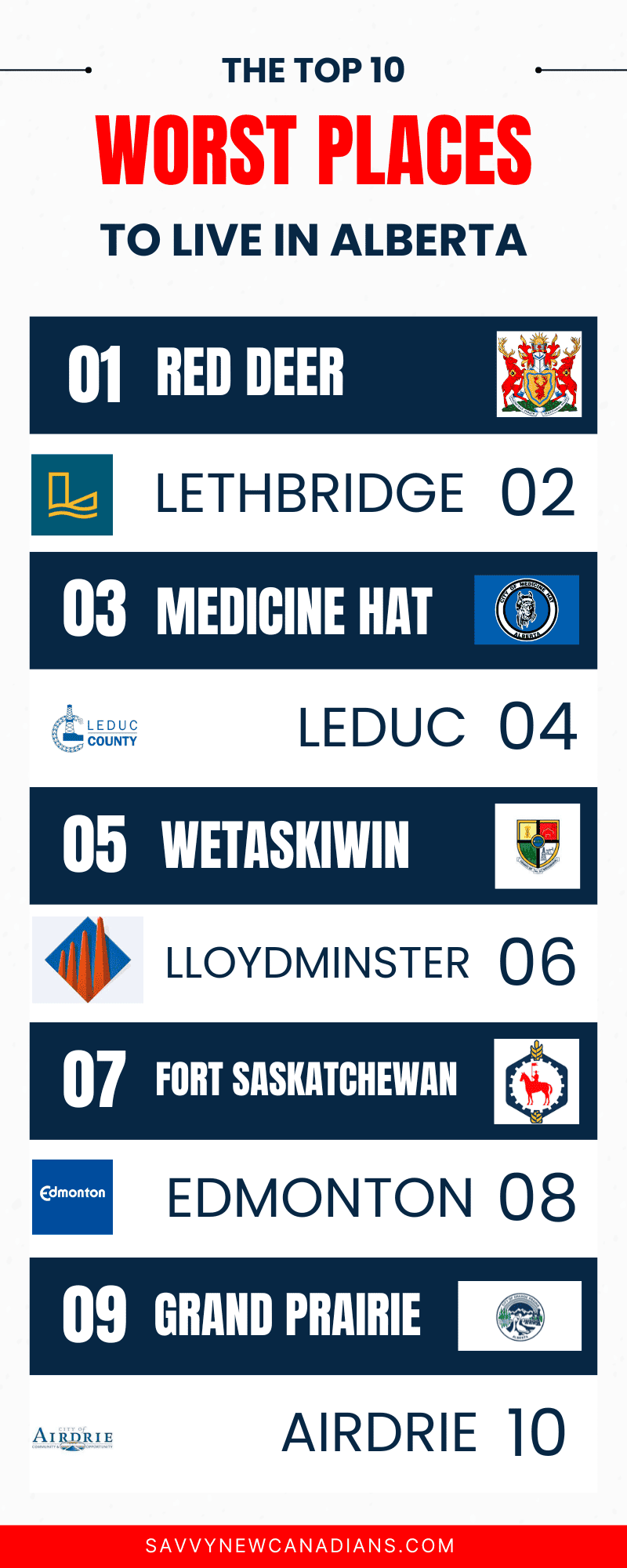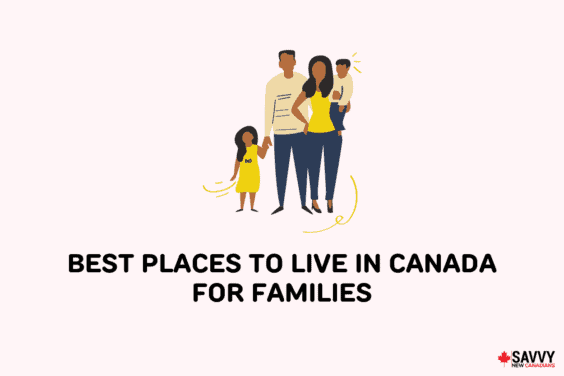Is Alberta really as perfect as people say? While famous for its economic prosperity and stunning landscapes, there are areas in the province that raise cause for concern.
Some cities in Alberta, such as Red Deer, Lethbridge, and Medicine Hat have high crime rates and safety challenges, making them among the most dangerous places to live in Canada.
This article covers the top 10 worst places to live in Alberta, what they’re best known for, and the reasons why they’re not ideal to live in.
Key Takeaways
- Alberta is often named as one of the most unsafe provinces in Canada. Its violent and non-violent crime severity index are both over 100 and there are at least 8,000 police-reported crimes in the province per 100,000 of its population.
- Alberta has a booming economy and low cost of living, but its winters can be harshly cold and it’s not as culturally diverse as other provinces.
- St. Albert is one of the safest towns in Alberta, thanks to the local government’s commitment to safety and the community’s well-being.
Top 10 Worst Places to Live in Alberta
1. Red Deer
The vibrant city of Red Deer has faced an ongoing struggle with crime, which has somewhat tarnished its appeal. As revealed by sources such as the Canada Crime Index, Red Deer’s crime rate places it prominently in discussions about safety concerns.
The Crime Severity Index (CSI) paints a vivid picture of Red Deer’s crime landscape. The city’s CSI is notably higher than the national average, reflecting a range of offenses that impact the daily lives of its residents. While Red Deer boasts a dynamic arts and culture scene, its safety challenges can’t be ignored.
2. Lethbridge
The city of Lethbridge, characterized by its scenic location along the Oldman River, has faced its own set of challenges. Crime rates, particularly violent offenses, have been the subject of ongoing discussions within the community.
According to the Canada Crime Index, its crime data suggests a need for caution when considering the city as a potential residence. While the city boasts natural beauty and esteemed educational institutions, safety remains a concern.
3. Medicine Hat
Medicine Hat, often called the “Gas City, has a long history and lots of culture. But there have been worries about crime there too. The crime severity index tells a story that might be a bit tricky, but it’s important to check it out.
People who live in Medicine Hat have said they worry about being safe, and the numbers about crime show why they feel that way. Balancing the city’s heritage with the need for safety is something that both residents and potential newcomers need to think about.
4. Leduc
Leduc is close to Edmonton and has strong ties to the economy. This means both good things and challenges come with it. Looking at the numbers about crime can help us understand how safe it is to live there.
As Leduc tries to make sure that people can enjoy the city and also be safe, it’s important for those who already live there and those who are thinking of moving there to know what it’s like.
Figuring out what’s good about Leduc and what needs to be improved will help people make smart choices about living there.
5. Wetaskiwin
Wetaskiwin is a special place with a lot of history and culture. But there are also worries about crime. Looking at the numbers can help us understand the truth about how safe it is to live there.
Its residents hold a deep fondness for their city nonetheless, evident in their efforts to address safety concerns with the help of the RCMP.
6. Lloydminster
Lloydminster, unique in its border-town status spanning Alberta and Saskatchewan, faces distinctive safety considerations. The city’s location between two different areas creates an interesting situation about crime.
Even so, Lloydminster can still be a good place to live because of its strong economy and quiet, rural feel, which is perfect for people who work in oil or farming.
7. Fort Saskatchewan
Fort Saskatchewan, a city with its own unique features, faces safety challenges that affect its livability. A close look at crime statistics helps us understand the situation.
This is unfortunate since Maclean’s magazine ranked the city among the 100 best places to live in Canada for 2021.
But it’s worth noting that the community is taking steps to address the crime situation and improve overall safety.
8. Edmonton
Edmonton, Alberta’s capital, possesses a dynamic blend of urban living and natural beauty. But its status as a bustling metropolis highlights safety considerations that need to be addressed.
While the place has plenty to offer, crime data from sources like the Canada Crime Index raises questions about the trade-offs between safety and convenience.
9. Grand Prairie
Grand Prairie’s picturesque surroundings and abundance of recreational activities are irresistible. But it’s important to consider some challenges, such as crime, when assessing the city’s appeal.
Crime data provides a backdrop for understanding the city’s safety profile. By taking these factors into account, you can get a more complete picture of what it’s like to live in this city.
10. Airdrie
Airdrie, a rapidly growing community with a strong economy, faces its own set of safety considerations. As this city expands, understanding its crime statistics and safety initiatives becomes increasingly important.
The crime data shows that there are safety issues that the city needs to deal with as it grows and becomes a bigger city.
What Are the Best Places to Live in Alberta?
Some of the best places to live in Alberta are the following:
- Calgary provides a thriving job market and a high standard of living, making it an ideal choice for those seeking economic opportunities.
- Banff is perfect for nature lovers due to its stunning mountain scenery and many outdoor recreational possibilities.
- Canmore is another great destination, especially for those who love the great outdoors.
Pros and Cons of Living in Alberta
Living in Alberta has both good and bad points. Here’s a quick overview:
Pros
- It has a booming economy and the highest wages in Canada, which can provide you with more opportunities and financial stability.
- Low taxes and a low cost of living can help you save more money and enjoy a higher quality of life.
Cons
- Winters can be very cold, and there may not be many places to enjoy nature.
- Crime happens more often in Alberta, and there may be fewer diverse cultures, which could make it harder to fit in and stay safe, especially if you’re from a different background.
Is it Worth Living in Alberta?
Alberta offers a high standard of living with its strong economy, superior health care and education, and stunning natural beauty. It provides excellent recreational opportunities and benefits from having no provincial sales tax.
But considerations such as harsh winters, the potential cost of living, economic fluctuations tied to the oil and gas industry, and safety might impact your decision.

FAQs
The town with the highest reported crime rate in Alberta may vary from year to year. But cities such as Red Deer and Edmonton have consistently featured in discussions about crime rates, reflecting the need for a balanced assessment of their livability.
Among the safer communities in Alberta, St. Albert is famous for its commitment to safety and community well-being. Its relatively lower crime rate adds to its reputation as a desirable place to live.
Alberta’s affordability can be attributed to its resource-based economy, which has historically been centred around industries such as oil and gas. Also, factors like lower population density and competitive housing prices contribute to the province’s cost-effectiveness.
The title of the “most beautiful” town in Alberta is subjective and often varies based on personal preferences. Towns like Banff and Jasper are famous for their beautiful mountains and outdoor fun. They are also praised for their natural beauty and how pretty they are.
Related:



